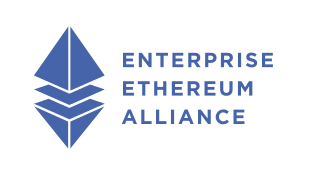Educating the Business Community About the Power of Ethereum
The Ethereum business ecosystem has seen rapid growth in recent years, which speaks directly to the technology’s value and relevance in today’s world. However, the only way to ensure that growth continues is to equip a wider range of business professionals with the education and tools necessary to begin building on Ethereum.
At the EEA, we put education front and center, and we’re working hard to arm businesses with the information, training and support they need to enter the Ethereum space and elevate their organizations with this valuable resource.
That’s why we’re so excited to share our series of educational primers, designed specifically for those new to the Ethereum ecosystem. These primers will offer introductions to many of the different concepts and facets of Ethereum (and blockchain as a whole) to help more professionals get started on the platform.
Is there a particular topic you think we should explore in an upcoming primer? We want to hear from you. Email us at [email protected] to share your ideas.
Watch our short introductory video to hear from EEA Executive Director Dan Burnett about the details and value of this program.
Introduction to DAOs
What is a DAO?
DAO stands for Decentralized Autonomous Organization. They are Internet-native, member-owned and managed organizations that bring individuals together to combine resources and work toward a common purpose, such as investing in startups, purchasing real estate, managing NFTs, etc. DAOs today are built on blockchain technology and decision making depends on smart contracts, code written into the organization’s blockchain that automates actions as soon as predetermined criteria are met. Most DAOs run on Ethereum.
Background
While the overarching concept of a DAO has been around for quite some time, DAOs as we understand them today emerged during Ethereum’s infancy and are tied to an article penned by one of the blockchain’s founders, Vitalik Buterin. The idea depended heavily on smart contracts, a common and fundamental feature of all DAOs. Smart contracts define a DAO’s rules and hold its funds. They are also key to its decentralization. As opposed to having a boss or leadership team calling the shots, DAOs make decisions through voting on member-drafted proposals, and those decisions are automatically executed by smart contracts. The smart contracts prevent any action outside of the agreed upon rules and can only be altered by a group vote.
Often, DAOs begin as simple group chats whose participants decide to organize and decentralize over time. In most cases, DAO development starts with an initial core team. Over time, that team gains a group of contributors, and as it grows and scales, working groups are developed to execute across different functions, such as product development, governance, recruiting, etc. Together, those groups work toward the shared mission. They use a variety of tools to help create and manage the DAO. Known collectively as DAO Tooling, these tools include but are not limited to, DAO framework tools; treasury management tools; knowledge management tools; and governance and voting tools. While all DAOs share some fundamental characteristics, their purposes are varied and wide reaching. There are DAOs dedicated to everything from building products, to gaming, to charitable causes and beyond.
There are many benefits to the way DAOs are structured. Decentralization means no individual has complete control, which helps increase both security, as there is no central point of failure, and participation, as every member has an equal opportunity for ownership in the DAO. Smart contracts help ensure execution and progress and make it easier to work with individuals you haven’t met by eliminating the need to put faith in others to execute on actions. Additionally, due to the automation of smart contracts, the costs of running DAOs are extremely low.
Indeed, for many, DAOs are an extremely effective way to work. But, they also present challenges. One significant point of caution is that DAOs raise a number of thorny legal and regulatory issues which have yet to be settled. Lack of regulatory certainty when it comes to management, taxation and other issues can be a hindrance. The majority of U.S. states, for example, don’t recognize DAOs as legal entities.
Another challenge for DAOs is that decision making requires a consensus, either from all members or from a smaller subset of members, depending on the issue. This can slow down productivity and make immediate updates challenging. Additionally, due to the nature of smart contracts, DAOs can be susceptible to bugs and hacks. In fact, a famous hack occurred with one of the first DAOs, a group known as “The DAO,” which launched in 2016 as a venture capital fund. It got off to a spectacular start, raising 12.7M Ether in what was an unexpected crowdfunding success. However, not long after, a hacker found a vulnerability in the smart contract and was able to steal 3.6M in Ether. This ultimately contributed to The DAO’s downfall. Today, specific tools and templates are available to help mitigate such attacks, making the risk much lower.
DAOs certainly have some hurdles to overcome before they truly enter the mainstream, but there is no doubt that they’re gaining traction and have the potential to shake up the business world. ConsenSys has called 2022 “The Year of the DAO,” and billionaire Mark Cuban referred to DAOs as “the ultimate combination of capitalism and progressivism.” Suffice it to say, with the myriad benefits DAOs offer, we can expect to see more of them popping up in business contexts in the coming years. Some in the space even believe DAOs will replace LLCs in the near future.
About The EEA
The Enterprise Ethereum Alliance (EEA) enables organizations to adopt and use Ethereum technology in their daily business operations. The EEA
empowers the Ethereum ecosystem to develop new business opportunities, drive industry adoption, and learn and collaborate.
To learn more about joining the EEA, reach out to [email protected] or visit https://entethalliance.org/become-a-member/.

